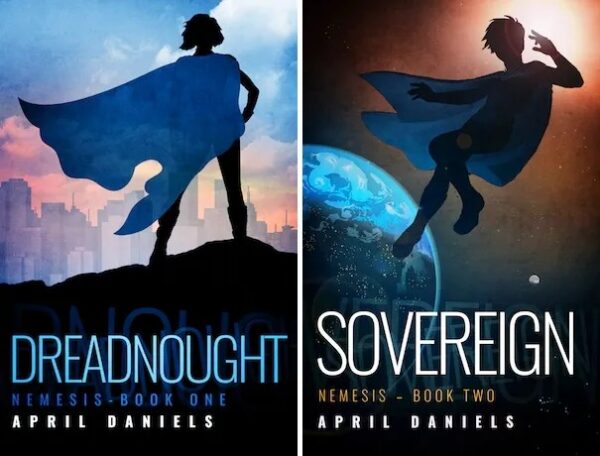Amazon Affiliate Link | Bookshop.org Affiliate Link
I’m not all that into superheroes—I don’t really read comic books, I don’t follow superhero media—but I really enjoyed both Dreadnought and its sequel Sovereign by April Daniels. The books are set in a comic-book-esque modern day, where supervillains appear in history textbooks and it’s not unusual to see flying strongmen punch antimatter androids above the downtown skyline. It’s during just such a superfight that the mantle and powers of one of the world’s strongest heroes, Dreadnought, are unexpectedly passed (another comic book trope, I’m pretty sure) to trans teenager Danielle Tozer. The sudden superpowers speed up her transition, but bring with them a host of pressures, judgements, and expectations from both the heroes and villains of the city alike. With her life upended and her family providing its own challenges, Danielle has to figure out who she wants to be with the whole world watching.
I could pretty easily guess that Dreadnought and Sovereign are the author’s first novels; a few expository and dialogue choices stand out a bit awkwardly, and I simply can’t believe the characters are as young as the text claims them to be. All that is overshadowed, however, by how the books manage to balance the union of both trans and superhero narrative. Bluntly put, Dreadnought and Sovereign are popcorn books—and I mean that in the best way possible. They’re fun, easy to read and hard to put down, and best of all, they have a lot of heart. A lot of trans literature from the past 15 years feels laser-focused on struggle and suffering, so a story about being trans that’s also cheesy genre fiction was (to me, at least) a welcome breath of fresh air.
Coming at it from the other side, YA adventure novels that try to include a trans character without turning into a book about being trans can sometimes feel a little flat, a little shallow. In Dreadnought and Sovereign, Danielle’s life is equally defined by her gender and sexuality as it is by her superpowers; the worst the novels get is a little over-explanatory of certain terms and concepts related to trans identity and issues (but also superhero identity and issues, to be fair). As I read, I could actually feel myself relax as I realized that April Daniels was taking the struggles of a newly out trans woman seriously, but not losing sight of joy along the way.
The world needs more books like these. As coincidence would have it, April Daniels and I actually graduated from the same literature program (though separated by I’m not sure how many years). It’s not hard for me to imagine the pressure she must have received to write serious works full of sad, serious people, and I’m so glad that these are the novels she decided to create. Trans authors deserve just as much range of expression as their cis counterparts, and stories like Danielle Tozer’s deserve to be told.
Supposedly Daniels is working on a third book in the series, but with where Sovereign ended, I don’t think you should wait for it to be finished before picking up the first two—even if, like me, you’re not that into superheroes.
Content Warnings: transphobia, homophobia, child abuse, torture, violence
Samantha Lavender is a lesbian library assistant on the west coast, making ends meet with a creative writing degree and her wonderful butch partner. She spends her spare time playing and designing tabletop roleplaying games. You can follow her @LavenderSam on tumblr.



